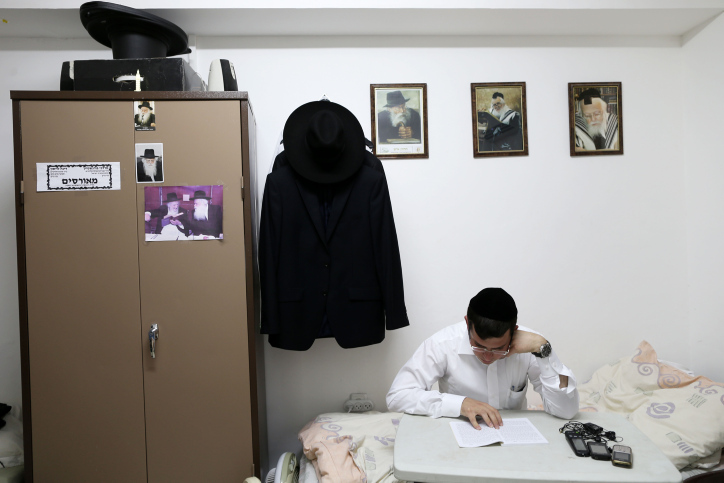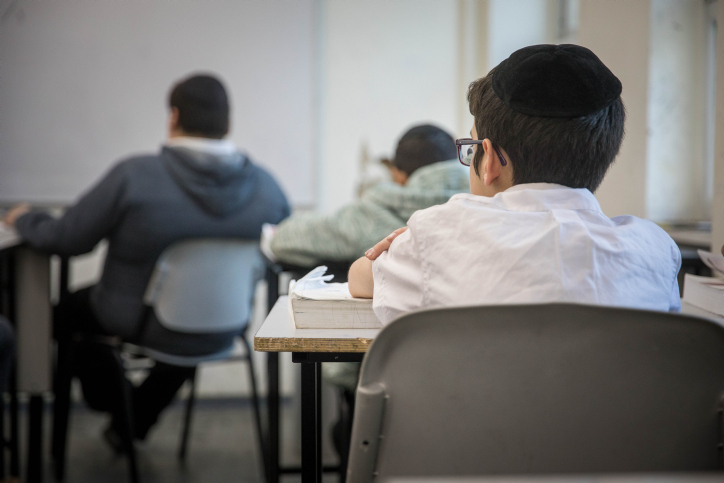Hashem on School Dropouts: "This Has Become a National Crisis, We Must Make a Change"
Rabbi Yisrael Azulai, an attendance officer, discusses the hidden dropout phenomenon from educational institutions. What does he see as the key to solving this problem? And how did he help a teacher who was routinely humiliated by a student, and why did his son's friends chase after him?
 (In circle: Rabbi Yisrael Azulai)
(In circle: Rabbi Yisrael Azulai)For 30 years, Rabbi Yisrael Azulai has been involved in education. He founded and managed a Talmud Torah, and today serves as the regular attendance officer in his hometown of Kiryat Shmona. His official role is to find a suitable educational framework for students experiencing difficulties. Recently, Rabbi Azulai joined the ranks of educational advisors in the "Yahalom" department of the Hidabroot organization. His choice to work in this field did not come out of nowhere. "This has become a national crisis," he says with pain. "The dropout rates are rising, and the situation indicates that something must change. I felt I had to give my all to fight this painful phenomenon."
He categorizes dropout types into two. "There are overt dropout situations - children who have faced ongoing academic or social difficulties and eventually find themselves outside the system. But there's a much more prevalent situation, that of hidden dropout. This involves children who sit quietly in class, appearing calm on the outside, but internally they are injured and hurting, and gradually struggle to function in the academic framework. This could be a child with learning disabilities who does not receive the help they need. They are not particularly noisy and therefore remain under the radar. It could be a child who is just not brilliant, and there's no one to push them forward. The more successful children receive praise, while there's no one to tell them they are a diamond. Such a child sometimes feels like a potted plant in class; it's not really good for them there. You don’t immediately see the dropout in these children, but years later, the gap that developed becomes evident."
 (Photo: shutterstock)
(Photo: shutterstock)
Hidden Dropout
How can we help those in such a situation?
"First, stop the old train. Stop blaming the symptoms of the disease - the mobile device or getting up late in the morning. These are just results of a lack of interest in learning, and they didn't lead to the situation. What leads to it, in my opinion, is mainly the attitude towards the child. We need to understand that every child sitting in the classroom is a world unto themselves, and each has their own learning path. There are also quite a few children who carry emotional difficulties, their minds less available for learning, and that too must be considered. It is important to see the child's soul here, long before the grades. When a child enters the classroom - they first need to receive a smile and love. When I was a teacher, I would start my class by chatting with the students. I lost part of the lesson time, but I gained them for weeks ahead. They felt seen, listened to, and from that place, the learning was entirely different."
Rabbi Azulai’s approach extended to other areas. "I remember when I was the head of Talmud Torah, we went on a trip with the students," he continues. "When breakfast time came, we brought out rolls and cheeses, and the teachers and I began to prepare sandwiches for everyone. A teacher approached me and said it wasn’t appropriate for a headmaster to prepare breakfast. I replied - on the contrary, it's my way to give them love, and more than that - when they see that even the headmaster cares for them, they will love the teachers more and the Torah they are being taught."
Nevertheless, Rabbi Azulai emphasizes that the main message comes from home. "I recall parents asking me how to encourage their son studying in yeshiva. I asked them to send him each time he returns to yeshiva after Shabbat at home with a loving letter, to give him a hug through that letter. The parents did it, and their son would hang the letter in his locker at yeshiva. One evening, when they visited the yeshiva, the supervisor approached them. He told them, 'I sometimes walk around the boys' rooms, and I have seen these letters hanging in your son's locker several times. Since I saw them, I understood why he is so happy in his learning and thriving. It is undoubtedly a direct result of the encouragement you shower upon him.'"
 (Photo: Nati Shohat / Flash 90)
(Photo: Nati Shohat / Flash 90)In addition to encouragement, Rabbi Azulai sees the importance of cooperation between parents and the educational staff. "I knew parents who consistently blamed the system. It's not that there are no problems, but you can't just blame; you have to unite forces and work together. The issue is that some find it difficult to accept that their child needs significant help, and this is their way of escaping confrontation. In any event, we went through six months of tough conversations with those parents without reaching a middle ground. All this until I asked to come to their home, to sit with them over a cup of coffee peacefully. The change of atmosphere was significant, and a place that is not the school seemed less threatening. Again, I opened things up to them, explaining how important it was to listen to capture the message. It was that evening something opened, and after that conversation, we finally began to see progress. The parents agreed to take their son for assessment, and from there, we were able to help him advance."
Another case that came under Rabbi Azulai's guidance highlighted this even more. "We had a case of a child who talked rudely and behaved terribly towards his teacher. The issue was raised in conversations with his parents several times, but the situation kept repeating. The principal was frustrated, and the teacher was very hurt, both standing helpless in the painful reality. When I saw this, I decided to talk to the parents myself. In that conversation, they admitted that sometimes they sat in the living room together criticizing the teacher. They thought their son did not hear these talks because he was playing in his room at the time, but the child heard them for sure, and it created hatred towards the teacher in him as well."
At this point, Rabbi Azulai asked those parents for a request that seemed far from reality. "I told them - first, stop those conversations, and then - start a corrective action. Let the child bring something to the teacher occasionally - a treat, a nice note, a drawing - something small. The parents asked me, 'Are you crazy? What will that help?' I explained that after actions, hearts are drawn, and such actions can lead their son to rebuild a good relationship. At first, it seemed like madness, but it worked. Later, the teacher told me in tears that this situation of a student humiliating him destroyed his confidence to stand before a class. He would come home completely hurt, sometimes even crying, and the positive change lifted him back up. He began to stick the notes the child brought him into his diary, and every day before prayer, he would look at them. The joy these notes brought him helped him pray with enthusiasm."
"No One Pays Attention to Me"
The results of educational efforts can sometimes only be seen down the road. "Many times, only at the end of sixth grade or after a student has been in yeshiva for a few years, you can clearly see if they flourish or fall apart," Rabbi Azulai explains. "Not everyone breaks boundaries immediately, yet many children feel trapped like in a prison. When my son was in yeshiva, I used to come and talk to him every week. After each such visit, his friends chased after me asking to talk with me too. They would directly tell me such painful things, tearing me apart inside. Within them was an explosive charge, and no one was paying attention to it. Their parents were not sufficiently involved. More than once, children told me, 'My parents put me here and don't pay attention to me at all.' There was no one to ask them what really happened to them, how they felt."
 (Photo: Yonatan Sindel / Flash 90)
(Photo: Yonatan Sindel / Flash 90)Many parents and teachers want, but feel too overwhelmed
"The main thing is to open the heart, to open it to listen to the child. When that happens, time will be found. You can't put the emphasis solely on learning or on a page of Gemara; you need to see why this child is late, why that one is down, why one is doing well in learning yet addicted to surfing the internet. It’s important to speak with them at eye level, in their language. If a child falls, do not alienate them. Studies will wait; souls will not wait. The most important thing is to give them a healthy and joyful soul. I had a case with a special education child undergoing difficult challenges in class. His mother took the first step and called me for help. I guided her to appropriate professionals, and the whole picture changed since then. They began to see the child's difficulties and help him. She told me back then, 'In five minutes, you changed my world.' It’s important for parents to be in that place."
As an example of the importance of accepting children, Rabbi Azulai brings what is written in the book of Hosea. "Hashem commands the prophet to marry a prostitute, and she bears him children. After a while, Hashem tells him to ban them, and in his pain, the prophet Hosea answers that he loves them and doesn’t want to ban them. There the message comes, Hashem says to him - I too love my children. Yes, there are children who annoy or disturb, children who cannot learn, but you cannot ban them. They are beloved sons, with all they bring, and from that place, you must help them."
With Heart and Soul
Where do emotional treatments fit into this whole story?
"Emotional treatments are undoubtedly a way to advance, but unfortunately, the desired change does not always come through them. Many parents tell me they took their child to emotional therapy, but the situation did not improve. He did therapeutic riding, swimming, and still remained with depression or anxiety. You have to be there with your finger on the pulse - to see why this is happening. Sometimes the treatment is not suitable; there have been times I asked a child if he enjoyed the activity and he replied, 'I hate it.' Overall, if something in the relationship with the parents does not change, the emotional void remains as it is. So parents take a child to a hundred treatments, but all they need is a walk with their father. Sometimes an hour together a week is worth more than anything. Even when the treatment does help, the main thing is not there, but in the attitude the child receives throughout the week at home."
A case highlighting the need for love shows through a child who just began steps at school. "He was supposed to enter first grade, but no school agreed to accept him because he was extremely hyperactive. The child’s single mother struggled alone, for a period of time, shuttling between different places trying to enroll him, taking her story even to the press. I, too, worked extra hours to find a solution for him. Eventually, I requested his admission into a specific class, with my close supervision. I spoke with the school principal and the teacher, asking them for just one thing - to lavish him with all their heart, no matter what he would do."
The class teacher embraced the challenge with both hands, and soon results came. "She poured so much love on him that it is indescribable," Rabbi Azulai describes with emotion. "In the first month, he was causing problems, even ran away from school, but she didn’t break. Slowly we saw how something within him calmed. With years, the child integrated into a special class for behavior modification, and his difficulties were accurately diagnosed for the appropriate response. He is now finishing sixth grade, flourishing completely. The love and warm embrace the teacher provided at the beginning lifted him. In general, several people managed to change the approach here - the school staff, the committees he went through, even his mother. Initially, they were overwhelmed with 'No, no, no,' and couldn’t even analyze the situation. The mother found it hard with even visiting a psychiatrist, understanding her child needs special care. But as soon as they saw him with a positive eye, a child's flower blossomed."
In conclusion, Rabbi Azulai says, "We must enter the hearts of the children, and that can only be done when our heart is open. I am not only talking about extreme cases, but about each and every one. Knock on the child’s room door, ask what’s up, don’t settle for an 'Okay' answer, delve deeper. If we succeed in being there for our children, to truly listen to the soul sitting there inside, that will nurture them to be healthy individuals, and from there they will flourish in other areas."

